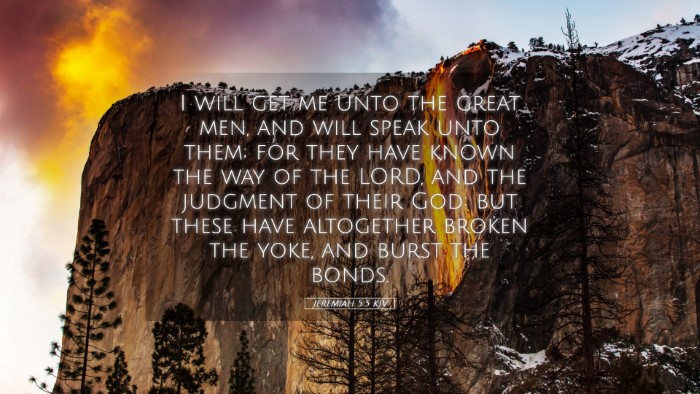Commentary on Jeremiah 5:5
Jeremiah 5:5 states, “I will go to the great men, and will speak unto them; for they have known the way of the Lord, and the judgment of their God: but these have altogether broken the yoke, and burst the bonds.” This passage highlights the prophet's frustration with the spiritual state of Judah. In this commentary, we will explore various insights from public domain commentaries, offering a detailed examination suitable for pastors, students, theologians, and Bible scholars.
Understanding the Context
In understanding Jeremiah 5:5, it is crucial to recognize the sociopolitical and spiritual context in which Jeremiah prophesied. The nation of Judah was on the brink of disaster due to widespread idolatry, injustice, and a general turning away from God's commands. Jeremiah, often referred to as the weeping prophet, was called to speak God's truth to a wayward people.
Matthew Henry's Insights
Matthew Henry emphasizes the need for prophetic rebuke within the community. He interprets the phrase “I will go to the great men” as Jeremiah's acknowledgment of the responsibility of leaders to know God's ways. Henry notes:
- “It is the duty of those in authority to guide their people in the knowledge of God’s law.”
- “However, the leaders had not only failed in their duties but led the people astray.”
Henry points out that despite their position, the great men had lost sight of their covenant with God, hence their “broken yoke.”
Albert Barnes' Perspective
Albert Barnes provides a thorough linguistic and contextual analysis of the verse. He underscores the import of the “great men” being called out because they are typically expected to possess wisdom and understanding regarding divine matters.
Barnes remarks: “Jeremiah seeks to appeal to those who ought to be moral examples but instead are part of the problem.” He elaborates that while the leaders had the potential to recognize God’s judgments, they had failed to act righteously. They “‘have altogether broken the yoke’ which signifies their rebellion against God’s authority.”
Adam Clarke's Commentary
Adam Clarke discusses the theological implications of this verse, particularly the concept of leadership in biblical terms. He reiterates that, “If the leaders do not adhere to righteousness, it is no wonder that the masses follow suit.”
- “Clarke urges a call to spiritual accountability among leaders.”
- “He also delves into the consequences of such failure, highlighting the impending doom upon the unrepentant.”
Clarke poignantly reflects that when those who are called to lead abandon their post spiritually, the result is chaos and judgment upon the land.
Thematic Elements
Several key themes arise from Jeremiah 5:5 that are worth exploring in depth:
- Spiritual Leadership: The role of leaders in spiritual guidance is paramount. The failure of the “great men” indicates a serious lapse in spiritual duty.
- The Accountability of the People: While leaders are to guide, the people also have a responsibility to seek the Lord. A complacent populace will face the same judgment as their leaders.
- The Nature of Judgment: There is a clear assertion of the judgment that results from disobedience. Both individual and collective guilt are affirmed.
Application for Today
Applying the message of Jeremiah 5:5 to modern-day contexts involves recognizing the importance of spiritual leadership and the consequences of abandoning divine principles. This verse calls contemporary leaders, particularly within church settings, to reflect on their roles:
- Evaluate Leadership Effectiveness: Leaders must be evaluated not just by their titles but by their adherence to God’s word.
- Encourage Accountability: It’s imperative that congregants hold leaders accountable to the standards of Scripture.
- Seek Restoration and Repentance: Both leaders and individuals should seek to restore their relationship with God through repentance for the ways they have strayed.
Conclusion
Jeremiah 5:5 serves as a poignant reminder of the need for righteous leadership and the dire consequences of leading others astray. It calls for self-examination among leaders and laity alike to ensure that all are aligned with God's purposes. Through insights from Matthew Henry, Albert Barnes, and Adam Clarke, we see that the teachings of this verse echo through time, urging each generation to seek the light of God's truth diligently.


